Plan to phase out fire co-responders defended
 BBC
BBCThe chief executive of South Western Ambulance Service has defended the decision to end the use of medically-trained firefighters to respond to emergency calls.
John Martin said volunteer community first responders were now able to provide "at least as much if not more" cover than fire co-responders.
Mr Martin told a meeting of the council of governors the decision was part of the trust's "commitment to improve response times" especially to category one calls including to "patients in cardiac arrest, when their heart has stopped beating".
A union has warned previously that some rural fire stations were at risk of closure due to the plan.
Higher level of care
The ambulance service said that in Cornwall in May community first responders attended 187 category one incidents, while fire co-responders attended nine.
It said community first responders were voluntary and received only expenses, costing an average of £20 per mobilisation, while fire services were paid £80 when fire co-responders were mobilised.
The Fire and Rescue Services Association said earlier this month it had been told the total annual savings projected by the ambulance trust was about £280,000.
At the time, the trust did not comment on the total projected savings but said financial considerations were just one part of its decision and patients would benefit from a higher level of care from community first responders.
'Saved multiple lives'
The move has also prompted concerns patient care could suffer.
However, Mr Martin said since the fire co-responder model was developed nearly 30 years ago, mobile phone prevalence meant the ambulance service could now send the "nearest available person" from more than 650 trained community first responders across the South West.
He said a phased move to the volunteer model over the next 12 months would result in an "enhanced" service.
Mr Martin said the ambulance service was "continuing to work together in collaboration" with other emergency services, pointing to tri-service officers in Cornwall and planning for major incidents.
He said community first responders could help deliver the trust's "primary objective" of having "at least as much if not more cover" for patients needing urgent care, while "making the most effective use of public money".
Mr Martin expressed "a huge thank you" to fire co-responders who had "no doubt saved multiple lives over the last 29 years".
Follow BBC Cornwall on X, Facebook and Instagram. Follow BBC Devon on X, Facebook and Instagram. Send your story ideas to [email protected].
